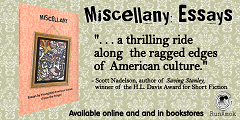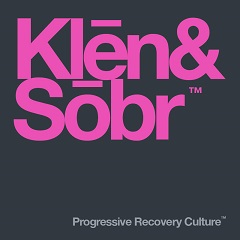To Thine Own Self Be True
I hate when quotes lose their context.
Take Robert Frost’s “Mending Wall.” The poem has the singularly memorable line: “Good fences make for good neighbors.” But the poet is not for making boundaries in the poem. In fact, he jokes with his neighbor farmer about the futility of building walls: “My apple trees will never get across / And eat the cones under his pines, I tell him.”
Tell that to Sarah Palin, not to get political, but I do love The Atlantic.
Shakespeare gets misquoted often. People say Shakespeare said, “Life is a tale told by an idiot, full of sound and fury, signifying nothing.” Shakespeare did not say that, he wrote it for a character in a play to say that. Macbeth says it in his final act. He just lost his wife and armies are coming for him. All his plots failed. Of course he’s a bit pessimistic. No need to claim Shakespeare’s worldview contains a meaningless existence.
I write this to bring up the Miracle of the Mundane’s
Slogan Series
Volume 5
There was “One Day at a Time” — “Attitude of Gratitude” — “Wherever You Go, There You Are” — “Keep it Green”
And now…
“To Thine Own Self Be True”
This one doesn’t need much context honestly, but the writer in me (my wife would say the dork in me) will provide it anyway.
It’s the scene in Hamlet when Polonius gives his son Laertes the “off to college speech,” before Laertes leaves Denmark to study in France. Polonius tells Laertes “To thine own self be true.” This holds a great importance in my life.
I did not know truth until I got honest with myself, (which I did here).
When I first admitted I was an alcoholic, I remember feeling like it was the first true thing I ever said.
Polonius’ speech doesn’t end there.
He continues to say that if you stay true to yourself, you can’t be false to any man. This is an important closure to the quote. I spent so much time trying to be someone I wasn’t, succumbing to peer pressure that:
Life was a changing room, where nothing that I tried on would fit.” (full article here)
Getting honest with myself solved my identity crises. Staying honest with myself keeps me honest with the world.
I have a series of posts bouncing around my brain concerning honesty. How I am honest today in spite of myself. How I often surprise myself by doing or saying the right thing even though my mind tells me otherwise. I’m thinking of calling them the channelled series — as in, the St. Francis channel of God’s peace series. More to come.
Polonius covers a few other recovery cliches in his advice to Laertes.
He tells Laertes to “Give every man thine ear, but few thy voice.” Translated to recovery, he is saying “take the cotton out of your ears, and put it in your mouth,” to emphasize how important it is to listen.
Polonius also tells Laertes: “Those friends thou hast, and their adoption tried / Grapple them unto thy soul with hoops of steel.” He might as well be saying, “Stick with the winners.”
What I love about cliches is the deep truth that exists in them if you can forage through the stigma that they are cliche. It’s like meditating on the sentiment expressed in a Hallmark card instead of tossing it directly in the recycling bin when you realize the sender was too lazy to even sign his name.
If there is a slogan or recovery cliche you’d like me to expand on, please let me know in the comments and I’ll do my best to oblige.
 Previous Post
Previous Post Next Post
Next Post












I have been translating Dylan Thomas’ poem “Do Not Go Gentle into That Good Night” for recovery and was actually thinking of writing a post about it. I invite your thoughts!
I love that idea. I love taking things such as quotes, widely known poems, and delving deeper into them.
Will the night mean like relapse or something? I think it’s really clever and I look forward to reading more.
I think yes, that the night is alcoholism and we want to fight and not go to it easily. My son was reciting this recently and it made me think of the poem as a call to stay among those you love by fighting against the demise of addiction. Very light and fluffy.
Nothing light and fluffy about that! That is profound and deep! What a great post it will make. I hope you write it. I want to read more!
I love this quote and that scene in the play. I read Hamlet in a lit class my first year of recovery at Santa Monica college. It was my first time reading Shakespeare sober and it knocked me out. It’s chockful of themes people in recovery can relate to: isolation, suicidal thoughts, regret etc. It’s no wonder Bill W, a theatre fan, was drawn to it and that scene.
Anyway, fantastic post Mark!
Today, I love the slogans. In the beginning I thought they were so cheesy. I came in feeling like I was dying and thought, “Really, this all you’ve got? These cheesy slogans?” Little did I know! To Thine own self be true is a favorite in our family… One girl has it tattood on her self, I had it stenciled on an entry wall… I had no idea how much these short silly little slogans would sustain me and give me a touchstone to cling to when the going got crazy. Thanks for this series.
You’re welcome Annette! I had such a similar experience with them. At first they seemed cliche and corny–then, when they started changing my life, I had a complete turn around with them. Thanks Annette for your comment!
EXCELLENCE! Really diggin’ the intellectual in you, man. Keep it up!
As always, Mark, I appreciate your keeping it simple.
The slogans. So simple. So true. When you hit the bottom, there they are.
This was my school motto. Little did I know how relevant it would become in later life?
Now THAT is a funny coincidence. Fitting? Destined? That’s awesome.
The nuns would be proud of me ?